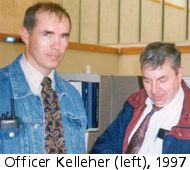7/9/2010
Massachusetts Court: Cops Powerless Outside JurisdictionMassachusetts Appeals Court rules cop unable to arrest for traffic misdemeanor outside his jurisdiction.

The Appeals Court of Massachusetts last month confirmed the principle that a police officer has no more power than any other citizen outside of his legal jurisdiction. The decision came in the context of an August 4, 2006 incident where Joseph Limone was driving his Oldsmobile on Montvale Avenue in Woburn just past Interstate 93. Limone rear-ended the car in front of him, which just happened to be driven by a uniformed police officer.
Somerville Police Officer Robert Kelleher just finished his shift and had been returning home. Kelleher got out of the vehicle, and approached Limone who repeatedly apologized. Kelleher ordered Limone out of the car. After noticing that the man appeared drunk, Kelleher pulled the keys out of the ignition so Limone could not drive away. He then told Limone to go back and wait in his car until Woburn police arrived. Minutes later, Woburn Officer David Simonds took over and asked Limone for his license and registration, Limone handed him a pack of cigarettes. Upon arrest, Limone blew a .12 on the breathalyzer and was booked for what would turn out to be his seventh conviction for driving under the influence of alcohol (DUI). The court of appeal, however, found fault with his initial arrest.
"A police officer's power to make a warrantless arrest is generally limited to the boundaries of the jurisdiction in which the officer is employed, and, absent fresh pursuit for an arrestable offense, a police officer is generally without authority to make an arrest outside his jurisdiction," the appellate court ruled. "Outside his jurisdictional boundaries, a police officer stands as a private citizen, and if not in fresh and continued pursuit of a suspect, an arrest by him is valid only if a private citizen would be justified in making the arrest under the same circumstances."
Because first-offense DUI is a misdemeanor -- Kelleher only had reason to suspect Limone of a first offense -- a private citizen would have no right to detain an individual for an apparent DUI.
"It was subsequent investigation that disclosed the defendant had been convicted on at least six prior occasions of operating while under the influence of liquor," the court concluded. "Thus, the seizure of the defendant was unlawful."
Because the initial arrest was unlawful, the evidence against Limone was thrown out as the 'fruit of the poisonous tree.' A copy of the decision is available at the source link below.


